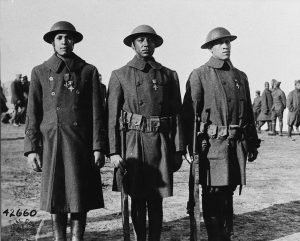Lester James Fossie
Lester James Fossie’s Personal Narrative was derived from information found in public records, military personnel files, and local/state historical association materials. Please note that the Robb Centre never fully closes the book on our servicemembers; as new information becomes available, narratives will be updated to appropriately represent the life story of each veteran.
Please contact the Robb Centre for further clarification or questions regarding content or materials.
Military Honor(s):
Distinguished Service Cross
Citation: The President of the United States of America, authorized by Act of Congress, July 9, 1918, takes pleasure in presenting the Distinguished Service Cross to Supply Sergeant Lester Fossie (ASN: 1403546), United States Army, for extraordinary heroism in action while serving with Company M, 370th Infantry Regiment, 93d Division, A.E.F., at Ferme-de-la-Riviere, France, 5 October 1918. A messenger having been wounded by an enemy sniper in the open between the lines, Sergeant Fossie immediately went to his rescue, and brought him into the company head quarters over ground swept by machine-gun and sniper fire.
Life & Service
- Birth: 3 October 1888, Metropolis, IL, United States
- Place of Residence:
- Race/Ethnicity: African American
- Death: 7 April 1932 Metropolis, IL, United States
- Branch: Army
- Military Rank: Supply Sergeant
- Company: [M]
- Infantry Regiment: 370th
- Division: 93rd
Lester James Fossie was born to Jacob (1858-1900) and Myra Baird (1866-1919) on 3 October 1888 in Metropolis, Illinois, the younger brother of John (1890-1927).
Before enlistment, James worked as a porter for a local hotel; he married Lilly Williams (1894-1931) in 1912 in Massac County, Illinois.
“James” enlisted in the U.S. Army on 25 July 1917 in Metropolis, Illinois as a Private, swiftly becoming Sergeant and Supply Sergeant by April of 1918. SupSgt Fossie and his company left Newport News, Virginia on 7 April 1918 on the U.S. Army Transport Ship President Grant, arriving in Brest, France on 13 April. SupSgt Fossie received the Distinguished Service Cross for his actions on 5 October 1918 near Ferme-de-la-Riviere, France;
“The President of the United States of America, authorized by Act of Congress, July 9, 1918, takes pleasure in presenting the Distinguished Service Cross to Supply Sergeant Lester Fossie (ASN: 1403546), United States Army, for extraordinary heroism in action while serving with Company M, 370th Infantry Regiment, 93d Division, A.E.F., at Ferme-de-la-Riviere, France, 5 October 1918. A messenger having been wounded by an enemy sniper in the open between the lines, Sergeant Fossie immediately went to his rescue, and brought him into the company headquarters over ground swept by machine-gun and sniper fire”.
Awarded DSC by CG, AEF, December 6, 1918. Published in G. O. No. 46, W.D. 1919.
SupSgt Fossie and his company left Brest, France, on 2 February 1919 aboard a U.S. Army Transport Ship, arriving at Camp Upton, New York on 9 February. SupSgt Fossie was Honorably Discharged from federal service on 24 February 1919.
Fossie reenlisted in the National Guard, serving with Co. L, 8th IL NG as a First Lieutenant up until January 28, 1924.
James and his wife Lilly had five children, Lester (1912-1925), James Jr. (1914-1938), Halfred (1922-1995), Horace (1927-2000), and Otis (1928-1979); James and Laura Hutchinson (1888-1922) had one daughter, Odessa (Hutchinson/Fossie/Alston) (1905-1989).
James worked as a restaurant cook and porter for a local fraternity in Springfield, Illinois in the 1920s-1930s. James was briefly arrested for violating the Volstead Prohibition Act- he was accused, and later acquitted, of conspiring to steal alcoholic contraband from his employer and selling it. James had other, minor, run-ins with local authorities throughout the 1920s and early 1930s.
After a period of mental and emotional instability, perhaps associated with the premature deaths of his eldest son and wife, and lingering wounds from his service, James committed suicide on April 7, 1932 by consuming acid. He was buried in the Masonic Cemetery in Metropolis, Illinois.
William Warfield, James Fossie, and Alonzo Walton in France with their Distinguished Service Crosses.
U.S. Army Signal Corps Photograph, NARA
